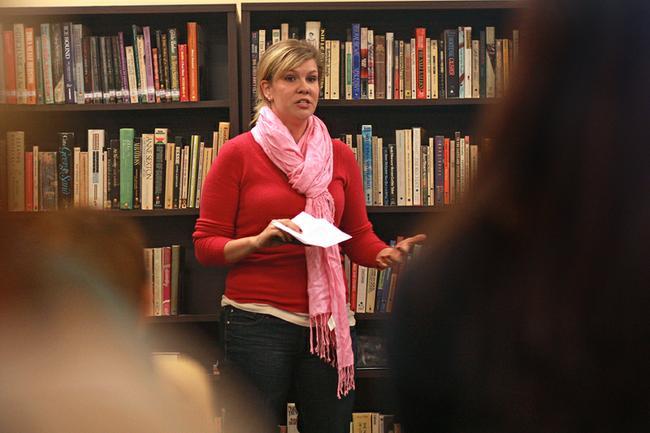In the middle of Breast Cancer Awareness Month, Women’s Center Adviser Suzy Day stood in front of a crowd of about 30 and presented the facts about awareness. The rest was up to the audience.
“It’s a relaxed program,” Day said in her presentation. “You guys know that, right? Chip in if you have any ideas.”
As a part of the Ms. Zou Series, the Women’s Center sponsored the free lunch and breast cancer awareness event Thursday afternoon. Information was tailored to breast cancer risk factors and secondary prevention.
The program is a small facet of a larger, international health campaign. Every October, major breast cancer charities observe National Breast Cancer Awareness Month by raising funds and spreading awareness across the country.
“One of the biggest things Susan G. Komen did was remove the stigma of talking about your breasts and touching your breasts,” Day said. “People talk about it more often now, which is partly why we are seeing a decrease in breast cancer mortality.”
The slideshow presented background information, risks, screening recommendations and healthy lifestyle choices.
The number of new cases of invasive breast cancer is expected to reach 230,480 this year. Nearly 39,520 patients will die from breast cancer, according to Day’s presentation. Young women are not exempt from the statistics.
According to the presentation, a large portion of the program centered on social myths about cancer, such as the common belief that young adults could not get breast cancer.
“Especially being a college student, I don’t think girls realize that breast cancer can hit so young,” sophomore Jessica Stirton said. “I’ve always just assumed that it only affects older women. This presentation and the work I’ve done with my sorority have helped me to see that that isn’t necessarily true.”
The presentation also stated the chances of getting the disease at age 20 are one in 1,760. At age 70, the probability increases to one in 27. Over the course of a lifetime, a woman has a one in eight chance of developing breast cancer.
“It hits home a little bit,” sophomore Rachel Karcz said. “I thought it was interesting because the statistics showed how widespread it was. It’s good to be aware that it could happen to you.”
Day said the biggest prevention is knowing the risks.
“If you are able to talk to your family about it and have a comfortable enough relationship, ask about your family history,” she said. “Ask if there has ever been any diagnosis or lumps that have been tested.”
Family history was the factor that drew some to the event.
“A lot of my friends from childhood, their moms have breast cancer,” sophomore Caroline Hennessey said. “It’s something that I’ve always been interested in and has hit home for me. I don’t want to have to worry about breast cancer in my life, so I’ll probably start doing self-exams.”
To conclude the presentation, Day provided instruction on how to properly perform a self-exam. She emphasized making it a monthly habit.
“Don’t let one month a year be the only time you think about your health,” Day said. “Use your own judgment. Trust yourself.”








